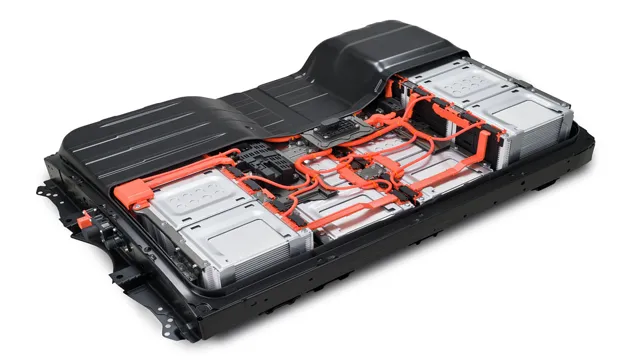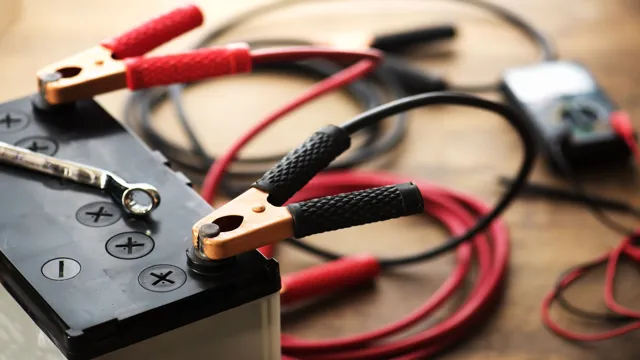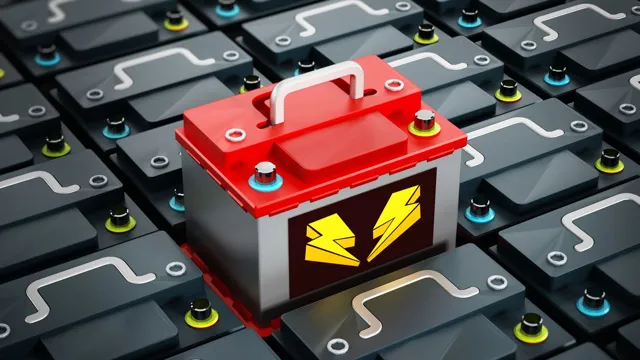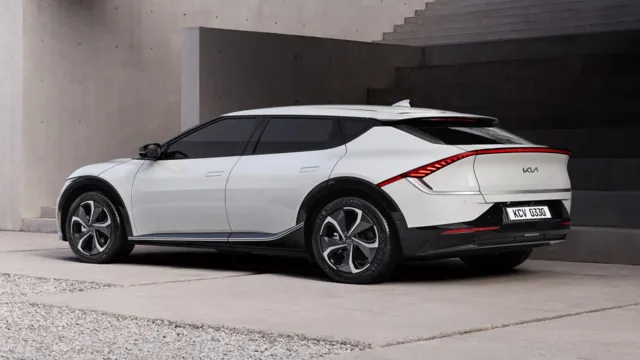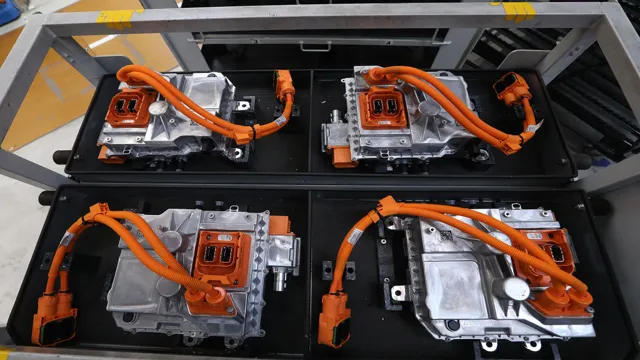Power Up Your Ride: Discover the Best Batteries for Electric Car Conversions
Electric car conversions have been on the rise lately, largely because it’s a more eco-friendly option to owning a traditional gasoline car. But, one of the most important components of an electric car conversion is the battery system. Without a reliable battery system, an electric car simply can’t function.
That’s why choosing the right batteries for electric car conversions is crucial in building the perfect vehicle. But what exactly is an electric car conversion? Simply put, it’s taking a traditional gasoline car and turning it into a electric-powered vehicle. This involves removing the gas engine and replacing it with an electric motor, as well as installing batteries to power the motor.
The battery system is integral to the conversion process because it’s what generates the power needed to run the car. Choosing the right batteries for your electric car conversion can be a bit of a daunting task, as there are a lot of options out there. Factors like lifespan, charging time, and capacity all come into play when selecting the perfect battery system.
But once you find the right one, your electric car will have a long lifespan and be an eco-friendly alternative to traditional gasoline cars. Investing in batteries for electric car conversions may seem like an extra expense, but it’s an investment that’s well worth it in the long run. Not only are you doing your part to help the environment, but you’ll also be able to save money on gas and maintenance costs.
With the right battery system, your electric car conversion can be everything you want it to be and more.
Why Choose Electric Car Conversions?
If you’re considering converting your gas-guzzling car to an electric one, you may be wondering what batteries are suitable for electric car conversions. It’s important to choose the right type of battery for your conversion, as it will determine the range and performance of your new vehicle. Lithium-ion batteries are the most popular option for electric car conversions, as they offer a high energy density and can provide a longer range than other types of batteries.
Additionally, lithium-ion batteries have a longer lifespan and require less maintenance than lead-acid batteries, which were commonly used in older electric car conversions. Investing in high-quality batteries for your electric car conversion may seem costly at first, but it’s important to remember that you’ll be saving money in the long run on gas and maintenance costs. Plus, you’ll be doing your part to reduce harmful emissions and protect the environment.
So why not make the switch today and start enjoying the benefits of electric car ownership?
Environmental Benefits
When it comes to transportation, electric car conversions are a great option for those who want to make a positive impact on the environment. By converting an existing car to electric power, you can significantly reduce your carbon footprint while also saving money on gas and maintenance costs. Electric cars are emissions-free, which means they produce no harmful pollutants that contribute to climate change.
Additionally, electric cars are much more efficient than traditional gas-powered cars, as they convert over 60% of the energy from the battery into motion, compared to the less than 30% of energy converted from gasoline. Choosing electric car conversions is a step towards a cleaner, more sustainable future, and is something anyone can do to make a positive impact on the environment. So why not make the switch today?
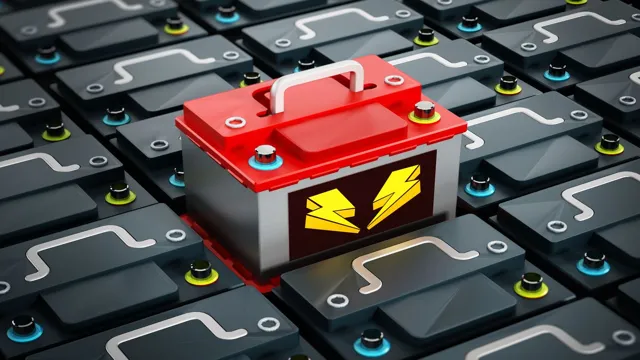
Cost Savings
One of the primary reasons to convert to an electric car is the cost savings. Electric vehicles are far more energy-efficient and cheaper to fuel than their gas-powered counterparts. When it comes to maintenance, electric cars don’t require frequent oil changes or have as many moving parts as traditional vehicles, meaning you can save a bundle on maintenance costs.
Plus, by converting an existing car to electric rather than buying a new electric vehicle, you can save on upfront costs. Electric car conversions typically cost significantly less than purchasing a new electric car. Overall, with the rising cost of gas and the ever-increasing need to be environmentally conscious, choosing an electric car conversion is a smart, cost-effective choice.
Types of Batteries for Electric Car Conversions
If you’re considering converting your gas-powered car to electric, it’s important to choose the right type of battery. There are many different options available on the market, each with their own pros and cons. Lead-acid batteries are the most commonly used, but they are heavy and have a shorter lifespan.
Lithium-ion batteries are lighter and have a longer lifespan, but they can be more expensive. Another option is nickel-metal hydride batteries, which are more energy efficient but can also be pricey. It’s important to consider your budget, driving needs, and environmental impact when deciding on the type of battery for your electric car conversion.
With the right battery, you can enjoy all the benefits of an electric car, including lower emissions, reduced maintenance costs, and a smoother driving experience.
Lead-Acid Batteries
Lead-Acid Batteries When it comes to converting a gas-powered car into an electric one, choosing the right type of battery is crucial. Lead-acid batteries have been used in electric cars for decades and are still a popular choice for many DIY converters. These batteries are relatively inexpensive compared to other types and have a high charging efficiency, which means they can be charged quickly.
Lead-acid batteries are also quite durable and can easily last for several years if maintained properly. However, they do have their downsides. These batteries are heavy and can add a significant amount of weight to your vehicle.
They also require regular maintenance and have a slower discharge rate than other types, which means you may not be able to travel as far on a single charge. Despite these drawbacks, lead-acid batteries remain a viable option for those looking to convert their gas-guzzling car into an eco-friendly electric vehicle.
Lithium-Ion Batteries
If you’re considering converting your car to electric, it’s essential to know the different types of batteries available. One popular choice is lithium-ion batteries, known for their high energy density and long life span. These batteries are commonly used in laptops and smartphones due to their lightweight design, which is also beneficial for electric car conversions.
Lithium-ion batteries are rechargeable and can hold their charge for an extended period, making them an excellent option for electric cars. They are also environmentally friendly, with a lower carbon footprint than other battery types. However, lithium-ion batteries can be expensive and require careful handling to prevent overheating or other safety issues.
Overall, lithium-ion batteries are an excellent choice for electric car conversion, providing long-lasting, eco-friendly power for your vehicle.
Nickel-Metal Hydride (NiMH) Batteries
For those looking to convert to an electric car, one important consideration is the battery. There are a few different types of batteries that can be used, each with their own advantages and disadvantages. One such type is the Nickel-Metal Hydride (NiMH) battery.
NiMH batteries are known for their high energy density, meaning they can store a lot of energy in a small amount of space. This is why they are often used in hybrid vehicles. They also have a longer lifespan than other types of batteries, making them a cost-effective choice in the long run.
However, they do have some downsides, such as being heavier and less powerful than other battery options. Additionally, they can be more expensive than some other types of batteries. Overall, the choice of battery for an electric car conversion will depend on a number of factors, including budget, range requirements, and personal preferences.
Factors to Consider When Choosing Batteries
Batteries are the heart of electric car conversions, as they provide the power needed to make your car run. When choosing batteries, you need to consider a number of factors, including capacity, weight, and durability. Capacity refers to how much power the battery can store, and is usually measured in kilowatt hours (kWh).
Generally speaking, the more capacity a battery has, the longer your car can run between charges. Weight is also an important consideration, as heavier batteries can reduce your car’s range and performance. Durability is also crucial, as you want a battery that can withstand the demands of daily driving for many years.
In terms of the main keyword “batteries for electric car conversions,” you’ll need to choose a battery that is specifically designed for use in an electric car, with the right voltage and amperage ratings to match your car’s motor and controller. It’s always best to consult with an expert to ensure you choose the best batteries for your specific needs.
Driving Range
When it comes to choosing batteries for your driving range, several factors should be considered. The first thing to take into account is the type of golf car you are using and its voltage requirements. Different golf cars may require various voltage batteries, and it is crucial to ensure that the batteries you choose fully align with your car’s specifications.
Additionally, the battery’s capacity will determine the driving range and the lifespan of the battery. Opting for high-capacity batteries will enable you to cover longer distances and require less frequent recharging. You should also consider the battery’s maintenance needs, warranty, and brand reputation.
A reliable battery from a reputable brand will save you from the frustrations of frequent battery replacements and costly damages. Opting for a lithium-ion battery can also result in a better driving experience, as it offers higher power density, longer lifespan, and reduced charging time. Ultimately, selecting the right battery for your golf car comes down to your specific needs and preferences, as well as being able to balance cost, performance, and longevity.
Battery Life
When it comes to choosing batteries, there are several factors to consider if you want to ensure good battery life. Firstly, you need to think about the type and quality of the battery. Lithium-ion batteries tend to be the most popular these days as they are lightweight, have a longer lifespan, and can hold charge for extended periods.
Secondly, you must consider the capacity of the battery. A larger battery capacity will often mean a longer battery life, so make sure to choose a battery that can meet your needs. Finally, temperature can have a significant impact on battery life.
High temperatures can cause batteries to degrade faster, so ensure that you’re not exposing your battery to excessive heat. In summary, when choosing a battery, consider the type and quality, capacity, and temperature to ensure that you get the most out of your battery and maximize battery life.
Conclusion
In conclusion, choosing the right batteries for your electric car conversion is crucial. You want to strike a balance between power, range, and cost. It’s like finding the perfect cup of coffee – too weak and you won’t get the jolt you need, too strong and you’ll be jittery all day.
So, take your time, do your research, and don’t be afraid to ask for advice. After all, with the right batteries, you’ll be cruising past gas stations and leaving emissions in the dust like a pro.”
FAQs
What type of batteries are best for electric car conversions?
Lithium-ion batteries are the best option for electric car conversions as they offer high energy density, long cycle life, and are lightweight.
What is the average lifespan of batteries used in electric car conversions?
The average lifespan of batteries used in electric car conversions is around 8-10 years, depending on usage and maintenance.
Can you use second-hand batteries for electric car conversions?
It is not recommended to use second-hand batteries for electric car conversions as their performance and lifespan may have already been compromised.
How much does it cost to replace the batteries in an electric car conversion?
The cost of replacing batteries in an electric car conversion can vary depending on the type of battery and the size of the vehicle. It can range from $5,000 to $20,000.
